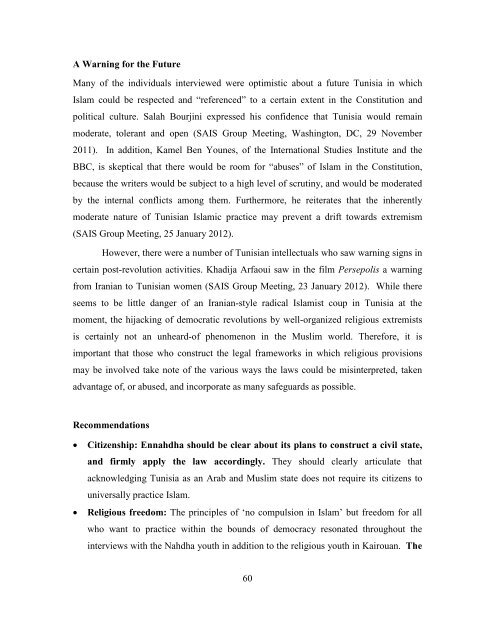Tunisia: Understanding Conflict 2012 - Johns Hopkins School of ...
Tunisia: Understanding Conflict 2012 - Johns Hopkins School of ...
Tunisia: Understanding Conflict 2012 - Johns Hopkins School of ...
You also want an ePaper? Increase the reach of your titles
YUMPU automatically turns print PDFs into web optimized ePapers that Google loves.
A Warning for the Future<br />
Many <strong>of</strong> the individuals interviewed were optimistic about a future <strong>Tunisia</strong> in which<br />
Islam could be respected and “referenced” to a certain extent in the Constitution and<br />
political culture. Salah Bourjini expressed his confidence that <strong>Tunisia</strong> would remain<br />
moderate, tolerant and open (SAIS Group Meeting, Washington, DC, 29 November<br />
2011). In addition, Kamel Ben Younes, <strong>of</strong> the International Studies Institute and the<br />
BBC, is skeptical that there would be room for “abuses” <strong>of</strong> Islam in the Constitution,<br />
because the writers would be subject to a high level <strong>of</strong> scrutiny, and would be moderated<br />
by the internal conflicts among them. Furthermore, he reiterates that the inherently<br />
moderate nature <strong>of</strong> <strong>Tunisia</strong>n Islamic practice may prevent a drift towards extremism<br />
(SAIS Group Meeting, 25 January <strong>2012</strong>).<br />
However, there were a number <strong>of</strong> <strong>Tunisia</strong>n intellectuals who saw warning signs in<br />
certain post-revolution activities. Khadija Arfaoui saw in the film Persepolis a warning<br />
from Iranian to <strong>Tunisia</strong>n women (SAIS Group Meeting, 23 January <strong>2012</strong>). While there<br />
seems to be little danger <strong>of</strong> an Iranian-style radical Islamist coup in <strong>Tunisia</strong> at the<br />
moment, the hijacking <strong>of</strong> democratic revolutions by well-organized religious extremists<br />
is certainly not an unheard-<strong>of</strong> phenomenon in the Muslim world. Therefore, it is<br />
important that those who construct the legal frameworks in which religious provisions<br />
may be involved take note <strong>of</strong> the various ways the laws could be misinterpreted, taken<br />
advantage <strong>of</strong>, or abused, and incorporate as many safeguards as possible.<br />
Recommendations<br />
• Citizenship: Ennahdha should be clear about its plans to construct a civil state,<br />
and firmly apply the law accordingly. They should clearly articulate that<br />
acknowledging <strong>Tunisia</strong> as an Arab and Muslim state does not require its citizens to<br />
universally practice Islam.<br />
• Religious freedom: The principles <strong>of</strong> ‘no compulsion in Islam’ but freedom for all<br />
who want to practice within the bounds <strong>of</strong> democracy resonated throughout the<br />
interviews with the Nahdha youth in addition to the religious youth in Kairouan. The<br />
60
















